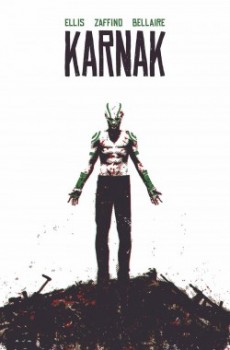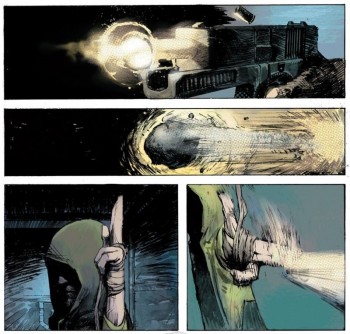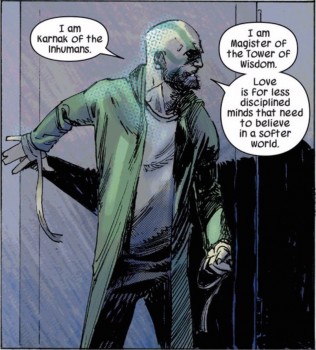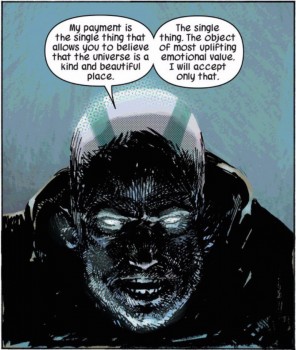The Flaw in Everything: Warren Ellis’ Karnak the Shatterer
 It’s the best part of the reading experience to run across a story with a new voice. Warren Ellis, of The Authority and Transmetropolitan fame, has assumed various voices, but I love his newest one: the narrative perspective of Marvel’s Karnak the Shatterer, a character associated with the Inhumans.
It’s the best part of the reading experience to run across a story with a new voice. Warren Ellis, of The Authority and Transmetropolitan fame, has assumed various voices, but I love his newest one: the narrative perspective of Marvel’s Karnak the Shatterer, a character associated with the Inhumans.
The Inhumans, created by Stan Lee and Jack Kirby, have been around since The Fantastic Four was in double-digits. Some of you may recall that Karnak is the one with the big head and the super-effective karate chops because his special talent is finding the structural flaws in things.
(Although, to be accurate, Karnak isn’t technically an Inhuman because was never exposed to the Terrigen mists — bring that up at a dinner party for a No-Prize!)
Over the years, Karnak’s powers and perceptions have expanded to include seeing the flaws in arguments, concepts, and people. His greatest achievement is finding the flaw in death, thereby returning from the dead.
It may sound a bit blithe to say it that way, but Karnak’s philosophical viewpoint has been strengthened over the years and bears some thematic resemblances to people like Iron Fist’s warriors of K’un-Lun or the Ancient One (of Dr. Strange fame).
The Inhumans of course, have been increasing in their importance in the Marvel Universe. I’ve seen internet theories that Marvel is downplaying the X-Men while up-playing the Inhumans, because Marvel doesn’t hold the X-Men movie rights.
I don’t know if that’s true, but the Inhumans have started having cosmic influence in the battles between the Kree and other star-spanning empires and are rewriting politics on Earth.
In late 2015, Marvel launched Karnak, a new book written by Ellis, where he is the philosopher who leads the Inhuman’s Tower of Wisdom. The first issue opens with Karnak contemplating a rock cube, and talking with his disciples about how they are all meaningless, and the rock, which will endure unchanged for generations and centuries, has more importance than they.

Karnak is pulled out of his contemplative leadership by SHIELD, who needs his help finding a kid who was exposed to the Terrigen Mists, but was apparently immune to them.
This is the straight-up A-plot, and it takes some twists and turns, but the real story is entirely in sticking close to Karnak’s point of view.
On the surface, it is a mildly Eastern flavored philosophical kung fu outlook, but as you get deeper, you see that disturbingly, Karnak has none of the love or respect for all creation and its parts.

Ellis describes Karnak’s philosophical viewpoint as speculative realism, trending towards the nihilistic frames of Peter Sjostedt-H and Eugene Thacker. (You can follow the links – the texts reward the careful reader.)
Nihilism is far from Eastern philosophies normally associated with contemplation and martial arts. To Karnak, death and life are simple differences in thermodynamic states.
Dr. Strange, Iron Fist, and Chuck Wendig’s Hyperion have monkish and zennish outlooks on life, but it’s refreshing to read a heroic nihilist and to try to untangle his motivations.

Karnak comes out irregularly, and I hope I haven’t missed issue #5, but comixology.com of course has the back issues. I really, really enjoy this series and will keep reading.
Derek Künsken writes science fiction and fantasy in Gatineau, Québec. He tweets from @derekkunsken, and blogs here regularly about comics and the fantasy field. He recently blogged about DC’s Semi-Reboot, which seems to be working for DC, the Co-Publishers at San Diego ComicCon were thrilled with sales and fan reactions.